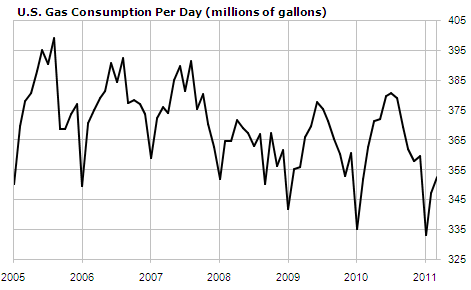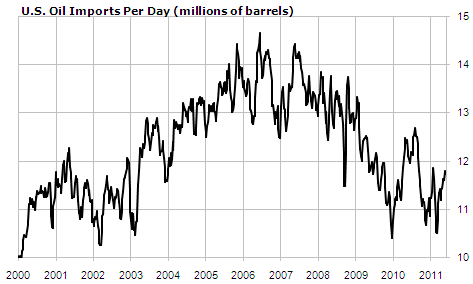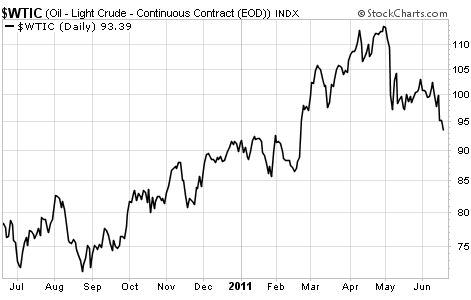| Home | About Us | Resources | Archive | Free Reports | Market Window |
Oil: Lower Prices AheadBy
Tuesday, June 21, 2011
Economists described it as "bleak."
On June 1, the jobs report showed the U.S. added 54,000 new jobs in May. That was 70% fewer jobs than expected. The economy isn't healing as quickly as folks thought it would.
Like I told you earlier this month, that's going to hurt demand for economic resources... starting with oil. Even longer-term trends are weighing on oil prices...
Today, I'll show you exactly why I expect big trouble ahead for oil prices... and what I'm doing to prepare.
Let's start with U.S. gas demand. Gasoline represents 43% of our oil consumption. That means a huge portion of our oil habit goes into our cars, boats, and lawnmowers.
U.S. gasoline production is cyclical from year to year. The low point occurs every January and peaks in the summer. But over the past six years, each peak and valley has been lower than the previous one.
 Since 2005, we've used less gasoline each year. Month-over-month, 2011 consumption has been much lower than 2010. The most recent data, from March 2011, shows us 3% below 2010 and 1% below 2009.
We see the same pattern in our oil import data...
 This March was the lowest volume of oil imports for that month since 2002. The trend in our oil demand is clear... And it's down.
When the world's largest consumer of oil is consuming less, you can expect oil prices to weaken. That began to happen in earnest last week. Here's a one-year chart of oil prices...
 The spike in oil prices earlier this year was a result, in part, of Middle Eastern unrest.
The media dubbed the trouble in the Middle East, "Arab Spring." It began in Tunisia in December 2010. By the end of February, seven countries teetered on the brink of overthrow. But the political unrest didn't influence oil prices until the end of the month, when riots in Libya turned into civil war.
Around 2.5 million barrels of oil came out of the tumultuous country per day. War eventually cut that supply by 1.5 million barrels per day. Oil spiked to its highest price since 2008... up 32% in two months.
Fast forward to today. Libya's war still rages, but we absorbed the lost production with no serious consequences.
At its June 7 meeting, OPEC – the global oil cartel – refused to increase oil supply. That sent oil prices back up to more than $100 per barrel. An OPEC increase would have sent oil prices down, possibly to less than $70 per barrel in the short term.
OPEC's policy suffers one fatal flaw... the members cheat. Each country has a quota of oil that it can produce. But the countries NEVER stick to those numbers. Here's an example: OPEC produced 26.22 million barrels per day last month. That's 1.375 million barrels per day (5%) more than the combined "quota." And it nearly covers all the oil lost from Libya...
And today, oil prices are down big: 18% off the high... Oil fell nearly 9% last week. Remember, earlier this year, oil prices were in the mid-$80s, before all the bad news in the Middle East. I suspect we could see oil prices fall back that low as the economic news worsens.
That's fine with me. I'd love to see some of the great oil companies get a whole lot cheaper. We'll take profits here as prices fall. We'll reload once oil prices stabilize and the market sells off the top performers.
I'll start the next round of buying with dividend payers (like the royalty trusts I described here) and the world's safest oil deposits (what I call "oil insurance").
There's no telling how long this will last. For now, mind your trailing stops and get ready to buy.
Good investing,
Matt
Further Reading:
"Owning an old, beat-up, decrepit oil field is lucrative," Matt says. "Fortunately, you don't have to be an oilman or industry insider to do it." Get the details here: Safe, Easy 7.4% Income from Decrepit Oil Fields.
A couple months ago, Matt told us about the single greatest prize in North America. "Buying stocks operating in this area at the right price is – and will continue to be – one of the greatest forms of wealth insurance in the world," he wrote. Read the full story here: A Unique Insurance Policy That Soars During Chaotic Times.
Market NotesTHE CHINA MIRACLE STALLS OUT As we've noted for the past year or so, one of the market's great debates centers around China. Put simply, the question is: Is China's economy humming along, slowing down, or heading for rough times? To get the answer, we're checking the price action in Hong Kong's benchmark stock index, the Hang Seng...
You see, despite its recent advancements, China is still led by a closed-door regime that censors ideas, manipulates government statistics, and jails dissidents. So we take its numbers and statements with an even bigger grain of salt than we do with U.S. government statistics.
Hong Kong, on the other hand, is a special region of China. It's one of the freest economies in the world. Due to its solid regulatory structures, tax rates, and transparency, Hong Kong ranks as the top three financial centers in the world (just behind New York and London). We trust numbers from Hong Kong much more than anything from the mainland.
Right now, the numbers coming from Hong Kong say, "bear market." Like most stock indexes, the Hang Seng soared off its credit crisis bottom of 2008/2009. It then stalled out and moved sideways for more than a year. And just last week, concerns about a China slowdown have pushed this index its lowest level in nine months. It's another reason to be cautious on the "China miracle."
|
In The Daily Crux
Recent Articles
|

